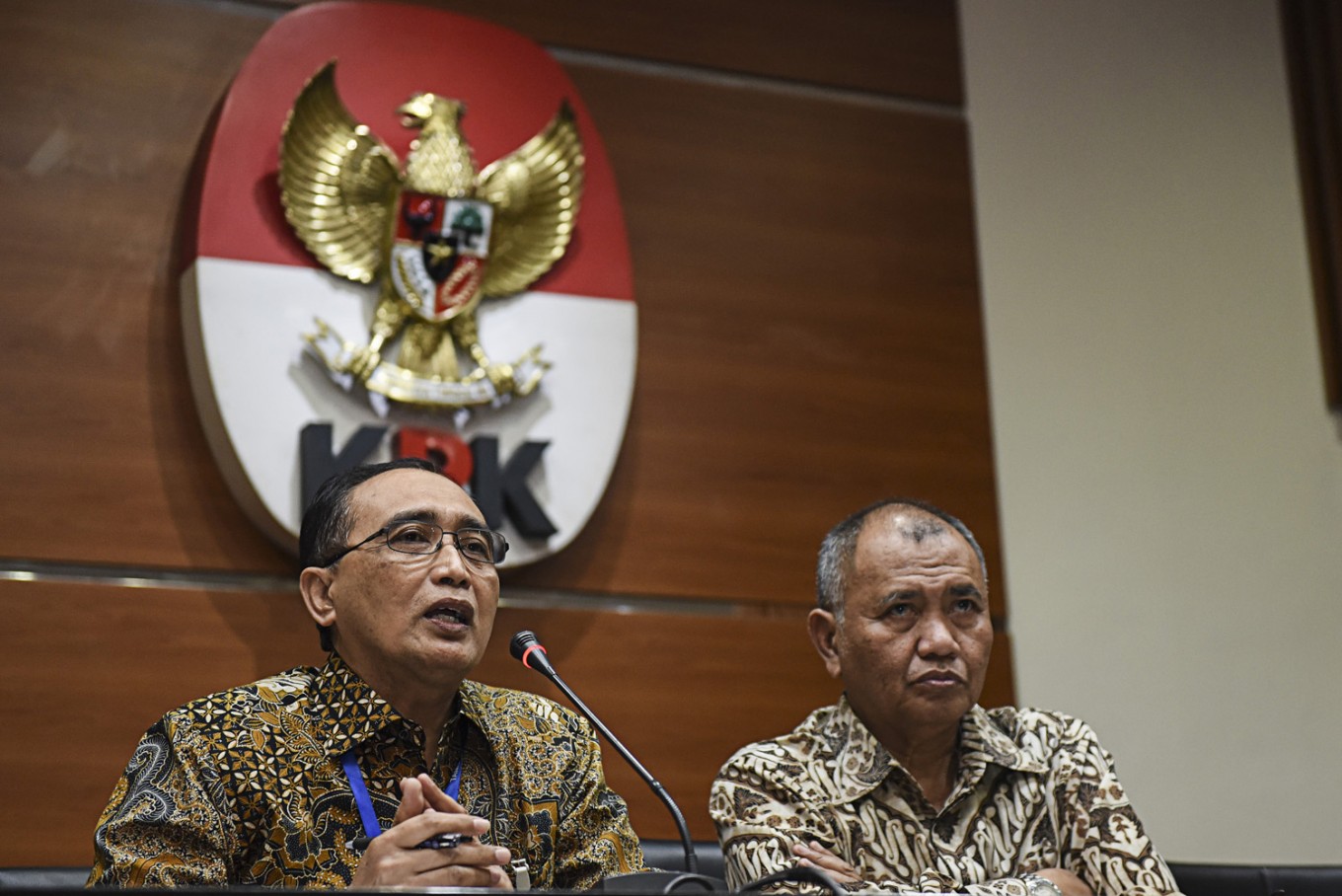Popular Reads
Top Results
Can't find what you're looking for?
View all search resultsPopular Reads
Top Results
Can't find what you're looking for?
View all search resultsEDITORIAL: Unfinished judicial reform
The Supreme Court should have revisited its internal reform, which it claimed had been in place, as soon as the KPK arrested a judge for the first time several years ago.
Change text size
Gift Premium Articles
to Anyone
 Against corruption: Supreme Court (MA) monitoring division head Sunarto (left) and Corruption Eradication Commission (KPK) chairman Agus Rahardjo (right) give a press statement on Sept.7 on the arrests of Dewi Suryana, a judge with the Bengkulu Corruption Court, and clerk Hendra Kurniawan, over alleged graft. (Antara/Hafidz Mubarak A.)
Against corruption: Supreme Court (MA) monitoring division head Sunarto (left) and Corruption Eradication Commission (KPK) chairman Agus Rahardjo (right) give a press statement on Sept.7 on the arrests of Dewi Suryana, a judge with the Bengkulu Corruption Court, and clerk Hendra Kurniawan, over alleged graft. (Antara/Hafidz Mubarak A.)
T
he Supreme Court was quick to respond to Manado High Court chief judge Sudiwardono’s arrest on Sunday for allegedly accepting bribes. Not only has it moved to dismiss the judge, although he has not been found guilty yet, the court also put in place an inquiry team headed by the assistant to Supreme Court chief Justice Sunarto to delve into flaws in internal supervision mechanisms that might have facilitated corruption.
The swift action is right and understandable as the case has put the judiciary’s reputation at stake. When the investigation is completed, the four-member team may hold one or two officials responsible for failing to carry out their oversight jobs and recommend improvements to ensure effective supervision.
But such measures may be too little, too late. The Supreme Court took tough action after the Corruption Eradication Commission (KPK) arrested Sudiwardono in a sting operation. The judge will be charged with accepting kickbacks from Golkar Party lawmaker Aditya Anugrah Moha. KPK investigators seized S$64,000 (US$ 46,848) of the $100,000 in cash that the politician had allegedly promised to influence an appellate bench handling a corruption case involving Aditya’s mother, Marlina Moha Siahaan, a former two-time Bolaang Mongondow regent.
The public has long sniffed corruption within the judiciary, which is why the term “judiciary mafia” was coined, in the form of verdict-buying practices despite reforms in the judiciary initiated in the early 2000s — partly sponsored by foreign donors. Most of the time the KPK could only ensnare court clerks, but let judges off the hook, unless they caught the judges in the act as in the case of Sudiwardono.
The whistle blowing mechanism, too, has proven ineffective and could backfire on whoever tries to file a report against allegedly corrupt judges as in the case of a lawyer who was found guilty of defamation for stating in public that he had bribed a Supreme Court justice.
The Supreme Court should have revisited its internal reform, which it claimed had been in place, as soon as the KPK arrested a judge for the first time several years ago. That the anti-graft body began its fight against the judiciary mafia should send the Supreme Court a clear message of its defective supervision mechanism.
The flaw was brought to the fore last year when a court clerk, on trial for a bribery case involving subsidiaries of a conglomeration, named then- Supreme Court secretary-general Nurhadi as his partner in crime. Suhardi later resigned, but until today the KPK has yet to fully investigate him. In 2012, another Supreme Court justice, Ahmad Yamani, was dismissed for conspiring with the court’s registrar to cut a drug dealer’s life sentence to 12 years.
Only external control will help the Supreme Court restore its reputation as internal mechanisms have proven to offer no remedy to the pandemonium. As the current law allows the court to resist outside supervision, just let the KPK do the job for the court’s own sake.








